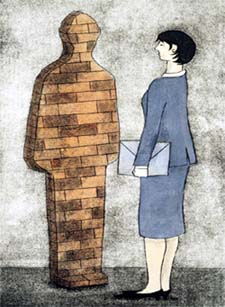Apr 14, 2025
Apr 14, 2025
 Most people get along with others. There might be the odd bit of friction between a person or two, but for the most part, most people get along.
Most people get along with others. There might be the odd bit of friction between a person or two, but for the most part, most people get along.
There is a sub-group of people however, that don’t seem to get along with almost anyone. These persons tend to project blame onto others for their conflict and may also cause others to feel guilty for not meeting expectations in the relationship. Further, some of these people while feigning interest in others, are really only interested in meeting their own needs. These people can be manipulative, self-serving and very distressing to others.
If they themselves are distressed, it is only due to the reaction of others, or for others not attending to their demands. They tend not to be distressed about their own behavior. In fact, when confronted on their own behavior, they are quite unable to see a problem with themselves and treat the confrontation as a serious attack. They are incredibly adept at making excuses that continues to exonerate themselves while making it seem like everyone else is the problem.
If you explore their childhood, one often sees a history of abuse or abandonment. There may have been parental alcohol or drug abuse and violence in the home. These persons may have been subject to many moves in childhood and care by multiple alternate caregivers.
Such persons may have a personality disorder. A personality disorder is a psychiatric diagnosis given to adults whose behavior brings them into conflict with many persons and society. Their behavior presents as frequently troublesome, inflexible and persistent. There are many behaviors common to persons with a personality disorder. When clusters of certain behaviors are seen in the same person over time, different types of personality disorders are identified. Hence 10 distinct types of personality disorders are distinguished and there are mixed types. Some persons are loud or dramatic, others cause rifts in relationships between other persons with themselves seeking to be in the middle, some may flaunt the law, believing it is their right to do so and others make everything seems about themselves. These characteristics relate to the histrionic, borderline, antisocial and narcissistic personality disorders.
Personality disorders cannot be treated with medication, although someone with a personality disorder may have another disorder such as depression or anxiety, which can be treated with medication. The personality disorder itself may be treated by psychotherapy; however, many persons with personality disorders are treatment resistant. In other words, the psychotherapy does not work and the personality disorder continues. The reason many are treatment resistant is due to the nature of the personality disorder. Another feature of the disorder is the inability of the person to view themselves realistically. They have tremendous difficulty or may be fully unable to realistically appraise or see their own behavior as troublesome. Therefore, they are quite unable to accept it is they who have the problem and needs the help.
People who live with someone with a personality disorder may come to believe they have the problem, rather than the person with the disorder. The one with the personality disorder is so good at projecting blame and their version of reality and are so inflexible, that others are drawn into accepting blame and feeling guilty. Hence treatment for the family and friends of the person with the disorder becomes paramount. Treatment or counseling is aimed at educating the family and friends as to the nature of the disorder and at helping these persons form strong boundaries to protect from the intrusions of the one with the disorder. Some family members or friends may also have to distance themselves to be self-protective and others may need coping strategies to manage situations as when they need to be near the person with the disorder.
If you are having difficulty with someone as described above and even if they do get help, get help for yourself. Describe the situation to the therapist and seek education, guidance and support to manage the relationship and make choices as to how you will cope and decide what is acceptable for you. You are allowed to be independent of the person with the disorder, regardless of the relationship.
19-May-2006
More by : Gary Direnfeld

|
Gary Direnfeld -- This old essay as presented by you in 2006 -- prior to austerity having popped up its head, amounts to utter rubbish. You are obviously pushing the notion that "one-size-fits-all" -- The: "We all have to get along sickness!" After all is said and done, what is normal? Therapists come and go -- many of these so called therapists are the sickest of the mentally ill. What percentage of people have not had an "ideal" childhood? You're really failing to provide a more analytically balanced approach to this matter...! |

|
That was a phenomenal article. it really spoke to me. thank you so much for your wonderful writing, and great insight. |